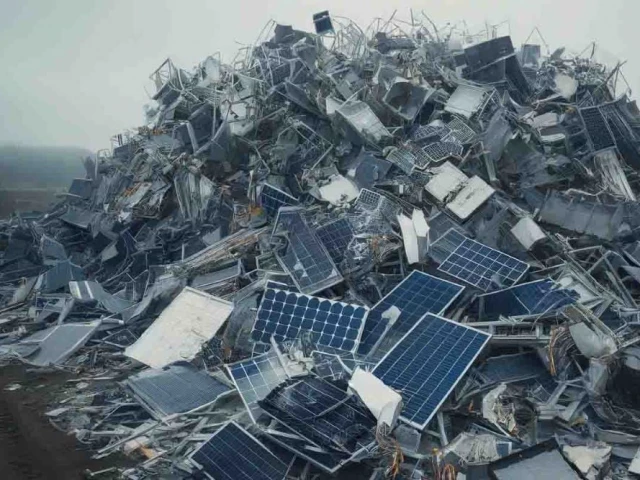Lahore:
The energy crisis and rising electricity prices in Pakistan have attracted citizens to alternative sources whose most prominent is solar energy. From installing solar cell panels on roofs to large solar parks, the sector grows rapidly. However, critics warn that storming rain, flooding and poor waste management due to climate change could make the system a new environmental crisis.
According to Dr. Salman Tariq, an environmentalist and assistant professor at the University of Punjab, whose solar panels are submerged in water, their silicon cells and hits are broken while electrical compounds become ineffective. “Especially batteries can cause short circuits or fires. When lead acid and lithium-ion batteries are damaged, toxic chemicals come in the soil and groundwater, causing airway, skin, kidney disease and liver diseases,” Dr. Tariq.
According to the data, Pakistan imported millions of solar panels and batteries with thousands of megawatt capacity in the last financial year. Since the average life of solar panels is 20 to 25 years, and for batteries is five to 10 years, the waste generated due to their shutdown will probably increase the manifold in the coming years. Experts believe that if the management structure is not created now, the crisis can be intensified as the current electronic waste (e-waste).
Pakistan is already under pressure from e-waste. According to a report published by Global E-Waste Monitor, Pakistan generates about 400,000 tonnes of electronic waste each year, including mobile phones, computers and refrigerators. Punjab is the worst affected province in this regard, where old goods end up in informal unwanted markets and disposed of in unsafe ways. The use of acid and fire to extract metals in these markets is dangerous not only to the environment, but also for the health of workers and children.
According to former geologist Dr. Naeem Mustafa is a solution to this problem urban mining, under which precious metals can be extracted from old equipment thrown in cities in modern and safe ways. “If this process is organized, the economy can benefit and the environment can be saved from damage,” informed Dr. Mustafa.
Mian Abdul Khaliq, an importer of solar panels, revealed that Pakistan urgently needed a policy of managing solar waste and recycling, otherwise the alternative energy system will lose its environmental benefits. “Recycling centers must be set to recover aluminum, copper and silicon from abandoned panels and batteries to be given tax incentives so that investors enter the sector,” Khaliq said.
According to environmental lawyer Altamash Saeed, waste, electrical and electronic equipment directive are strictly enforced in the European Union and there are clear recycling laws in Japan, but there is little regulation in this regard in Pakistan. “Internationally, the Basel Convention regulates border transfers of hazardous waste, but its implementation in Pakistan is weak,” said Saeed.
Dr. Tariq emphasized that the government should adopt the principle of extended responsibility for producers to give responsibility to companies for their products after using their products. “If this system is established, the environment will not only be protected, but new employment opportunities will also be created. Otherwise, the dream of pure energy may become a new climate crisis,” warned Dr. Tariq.
Ali Ijaz, Deputy CEO of Punjab Environment Protection Agency, revealed that there was currently no comprehensive policy for e-waste management in Pakistan, but work was underway and an effective strategy will be introduced soon. “New security standards are set for solar installations so the panels can withstand the effects of rain and strong wind,” Ijaz said.



